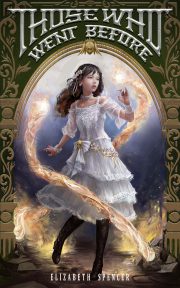Shooting at a Rolling Hoop: Predicting the Near Future
By Cat Rambo
In late 2019, Harry Turtledove approached me about a collaborative project he was doing for Arc Manor. He would write a near future novella in which the western part of the US seceded from the country in protest over US politics, James Morrow would write a second novella following on its heels, and I would write the third novella. All three would be published together under the title And The Last Trump Shall Sound, featuring a cover with a take on Grant Wood’s American Gothic, using Trump and Pence as the iconic couple.
As is my way, I agreed to the project and then forgot about it until Harry turned over his part in December, followed a couple of weeks later by James’. One thing that struck me immediately was how wildly different they were. Rather than a project where I’d need to smooth some edges in order to make things fit, my job was to deliver something just as different, but just as good, an intimidating task. I spent a lot of time cautiously circling first Harry’s meticulous manuscript, full of historical quotes and politicians considering things, and then James’ much spoofier porn-star-turned-subversive-infiltrator, featuring among other things, Mike Pence resurrecting and an animatronic Trump.
Meanwhile and equally surreal, 2020 started happening. I turned my novella into the publisher in January, having opted for more of a Black Mirror feel, focusing not on the politicians driving things, but the people affected by those decisions. The point I wanted to make was that it wasn’t so much a case of red states versus blue states as the rich and influential versus everyone else.
I’d done some reading of trends predicted for the next few decades in order to include little details like driverless vehicles, coffee plants being made extinct, and restaurants featuring meat substitutes rather than meat. I was pleased with myself for having been a good SF writer and brought a little science into the writing.
And 2020 kept happening, bringing with it bizarre moment after bizarre moment. Not just COVID-19 and murder hornets, but political moments that seemed to have been concocted by a fourth writer who was on considerably better drugs than we were. By the time I was checking the copy edits in April, it felt like the world had split away from the ones in our narratives, which did not include pandemics, protests, or a growing threat to the American postal system.
I refrained from twiddling to try to incorporate any of that; the most I did was underscore that a particular character’s grandmother had died in a pandemic. In putting this piece together, I asked Harry and Jim what they’d thought of the challenge.
Harry said: “I wrote before coronavirus appeared over the event horizon, then had to go back and put it in. I got to kill Trump off with it (fictionally, of course), which was enjoyable, but even so….You take chances when you do this stuff, that’s all.”
Jim replied:
Composing near-future science fiction sometimes feels like a mug’s game. When I sat down to write “The Purloined Republic,” my contribution to And the Last Trump Shall Sound, the last thing I imagined was a planet-wide pandemic descending as Donald Trump flailed around trying to get reelected.
At the last minute, for better or worse, I inserted some COVID-19 material into my novella’s climatic scene, in which Mike Pence resurrects Trump from the dead, but the question still remains: does the reader of a theme anthology like And the Last Trump Shall Sound have the right to expect accurate predictions?
Speaking for myself, I would appeal to the truism that science fiction is not ultimately about the future; it’s about the present, but reflected in the mirror of extrapolation (in my case, it’s a funhouse mirror). “The Purloined Republic” is essentially a thought experiment keyed to the sorry fact that millions of Americans have become transfixed of late by aggressively anti-democratic impulses—demagogical, nihilistic, paranoid, theocratic, Manichean, cancerous with certainty—a situation that’s hardly about to disappear tomorrow.
Not to compare myself to George Orwell, I would note that people still read 1984 even though we’ve managed to muddle our way a full thirty-six years beyond the date he fixed for his global totalitarian nightmare. Because Orwell never intended the novel as a prophecy, but rather as a warning, it still speaks to us. I like to think that, whatever the future brings, And the Last Trump Shall Sound will have made some sort of contribution to the great post-Enlightenment, postmodern conversation.
Over and over, something was brought home to me in this: when we write science fiction, we are writing about our own times, simply seen through a lens that changes how it is perceived, in a way that adds meaning. Paradoxically, the closer the time in which you’re trying, the harder this is to do. The far future is easy; so much can be hidden in those intervening, ample swathes of time. In the near future, the fabric is stretched out tighter, to the point where every imperfection catches your eye, and yet that gives it a reality, an immediacy, perhaps even an earnestness sometimes lacking in works more removed in chronological terms.
Our target hoop has rolled on and continues to do so, moving inexorably towards November. Our predictions are inaccurate. But perhaps despite that, our aim has remained true.
 Cat Rambo writes and teaches near eagle-haunted waters in the Seattle area. Their 200+ fiction publications include Nebula Award winning Carpe Glitter and stories in The Magazine of Fantasy & Science Fiction, Asimov’s, and Clarkesworld Magazine. Upcoming in 2021 are fantasy novel Exiles of Tabat (May, Wordfire Press) and space opera You Sexy Thing (September, Tor Macmillan). They run the Rambo Academy for Wayward Writers, offering online classes focused on speculative fiction writing, editing, and publishing. FInd out more at catrambo.com.
Cat Rambo writes and teaches near eagle-haunted waters in the Seattle area. Their 200+ fiction publications include Nebula Award winning Carpe Glitter and stories in The Magazine of Fantasy & Science Fiction, Asimov’s, and Clarkesworld Magazine. Upcoming in 2021 are fantasy novel Exiles of Tabat (May, Wordfire Press) and space opera You Sexy Thing (September, Tor Macmillan). They run the Rambo Academy for Wayward Writers, offering online classes focused on speculative fiction writing, editing, and publishing. FInd out more at catrambo.com.


